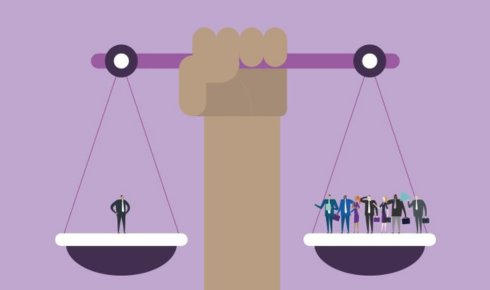Let me tell you something that will make government bureaucrats and some of my fellow attorneys deeply uncomfortable: every citizen has not just the right, but the constitutional obligation to defend themselves against governmental overreach and bureaucratic intimidation. And today, thanks to revolutionary legaltech innovations, ordinary citizens finally have the weapons they need to fight back.
The Fundamental Right to Self-Representation
The Supreme Court recognized in Faretta v. California that the Sixth Amendment includes the right to represent oneself. But this right extends far beyond criminal proceedings—it encompasses every interaction between citizen and state. When a parking authority issues an unjust citation, when a bureaucrat denies a legitimate claim, when government agencies hide behind impenetrable red tape, citizens have both the right and the responsibility to push back.
Yet for too long, this right has been theoretical rather than practical. How can an ordinary citizen navigate the labyrinthine procedures of government bureaucracy? How can a working parent find time to research obscure regulations and craft legally sound responses to official correspondence? The answer, increasingly, lies in artificial intelligence.
AI-Powered Legal Self-Help
Consider Poland’s Prawomat, a remarkable AI system that demonstrates how technology can level the playing field between citizens and institutions. This legaltech platform doesn’t just provide form letters—it analyzes specific legal situations and generates sophisticated responses tailored to Polish law and bureaucratic procedures. When a citizen receives an intimidating letter from a government agency, Prawomat can craft a response that would make a senior government lawyer take notice.
This is not legal advice in the traditional sense—it’s something more powerful. It’s legal empowerment. It transforms every smartphone into a legal research library and every citizen into their own advocate.
The American Revolution in Digital Self-Advocacy
Across the Atlantic, DoNotPay has pioneered what I consider the most significant development in citizen empowerment since the establishment of small claims courts. This AI-powered service has helped millions of Americans fight parking tickets, cancel unwanted subscriptions, claim compensation from airlines, and navigate government bureaucracies that have deliberately made themselves user-hostile.
The genius of DoNotPay lies not just in its technical sophistication, but in its recognition of a fundamental truth: government bureaucracy is designed to exhaust and intimidate ordinary citizens into submission. By automating the process of fighting back, DoNotPay strips away the psychological advantage that institutions rely upon to discourage legitimate challenges to their authority.
Legal Informatics and the Democratization of Procedural Knowledge
Here’s what establishment lawyers don’t want you to know: most legal work, particularly in dealing with government correspondence, follows predictable patterns. Legal informatics—the systematic analysis of legal procedures and outcomes—reveals these patterns and makes them accessible to everyone.
When an AI system analyzes thousands of successful appeals to parking authorities, it identifies the arguments that work, the procedures that must be followed, and the pressure points that bureaucrats actually respond to. This knowledge, once the exclusive province of specialized attorneys, becomes available to any citizen with an internet connection.
This is profoundly democratic. It returns to citizens the power to advocate effectively for themselves, rather than forcing them to choose between expensive legal representation and capitulation to government overreach.
The Constitutional Imperative of Technological Self-Reliance
The Founding Fathers could not have envisioned artificial intelligence, but they absolutely understood the danger of citizens becoming dependent on professional intermediaries for basic civic functions. They designed a system where ordinary citizens could serve on juries, run for office, and yes—represent themselves in legal proceedings.
Modern government bureaucracy has deliberately obscured these rights behind layers of procedural complexity. Every form requires cross-references to other forms. Every appeal process involves multiple steps designed to discourage pursuit. Every agency communication uses intimidating language calculated to make citizens feel helpless.
AI-powered legal tools shatter this artificial complexity. They restore the citizen’s ability to engage with government as an equal rather than a supplicant.
Programmatic SEO and Access to Procedural Justice
The beauty of modern legaltech platforms lies partly in their discoverability. Through programmatic SEO, these services ensure that citizens searching for help with specific bureaucratic problems find sophisticated AI assistance rather than predatory legal advertising or useless government websites that provide no real guidance.
When someone searches for help with a Social Security dispute, immigration paperwork, or tax appeal, they should find tools that actually help them solve their problem—not just expensive lawyers or bureaucratic runarounds. This is what real access to justice looks like in the digital age.
Fighting the Good Fight: Practical Resistance to Bureaucratic Intimidation
I have spent decades fighting cases where government agencies exceeded their authority or violated citizens’ rights. What strikes me most about services like Prawomat and DoNotPay is how they institutionalize resistance to this kind of overreach. They make it economically viable for citizens to fight back against even minor injustices.
This matters enormously. When citizens routinely challenge unjust parking tickets, improper benefit denials, and bureaucratic errors, they create a systemic check on government power. They force agencies to actually follow their own rules rather than relying on citizen ignorance and intimidation.
Every successful AI-generated appeal represents a small victory for constitutional government and individual rights. Multiply these victories across millions of citizens, and you have something approaching a peaceful revolution in the relationship between citizen and state.
The Ethical Obligation to Self-Advocacy
Some critics argue that citizens should simply accept government decisions and trust that the system works fairly. This is not just naive—it’s a betrayal of democratic principles. Citizens have an obligation to hold government accountable, and that obligation includes challenging government decisions when they appear wrong or unfair.
AI legal tools make this obligation practical rather than theoretical. They provide citizens with the knowledge and capability to exercise their rights effectively, without requiring law degrees or substantial financial resources.
The Transatlantic Divide: Common Law vs. Civil Law in the Digital Age
Here’s where it gets fascinating from a comparative constitutional perspective: the differences between American common law and European civil law systems create distinct opportunities and challenges for AI-powered citizen advocacy.
The United States, with its adversarial system and emphasis on precedent, has traditionally placed enormous power in the hands of skilled advocates who can navigate case law and procedural complexity. This creates both opportunity and necessity for AI tools like DoNotPay—citizens need sophisticated assistance to compete in a system designed around legal combat.
Europe’s civil law tradition, exemplified by systems like Poland’s where Prawomat operates, theoretically provides more predictable, codified procedures. Yet European bureaucracy has its own forms of complexity—multi-layered regulatory frameworks, EU directives overlaying national laws, and administrative procedures that can be just as intimidating as anything American citizens face.
What’s remarkable is how AI systems are adapting to these fundamental differences. Prawomat must navigate the more systematic but often rigid structures of civil law, while DoNotPay exploits the flexibility inherent in common law systems. Both approaches are succeeding because they recognize a universal truth: bureaucratic complexity is often intentional, designed to discourage citizen participation regardless of the underlying legal tradition.
The EU’s Regulatory Paradox and Citizen Empowerment
The European Union presents a particularly interesting case study. The EU’s emphasis on consumer protection and data privacy—embodied in regulations like GDPR—creates both opportunities and obstacles for AI-powered legal services.
On one hand, EU regulations often explicitly recognize citizen rights that can be enforced through AI-assisted advocacy. The right to data portability, the right to be forgotten, consumer protection in digital transactions—these are precisely the kind of systematic rights that lend themselves to automated enforcement through intelligent systems.
On the other hand, EU regulatory complexity creates layers of jurisdiction and procedure that can overwhelm even sophisticated AI systems. A citizen dispute might involve local law, national regulation, and EU directives simultaneously. This complexity, while protecting important rights, can also recreate the very barriers to access that AI tools are designed to overcome.
Large Language Models: The Next Constitutional Revolution
Now let me address what I consider the most significant development since the invention of the printing press: large language models and AI agents that can actually understand and manipulate legal language with near-human sophistication.
Current systems like DoNotPay and Prawomat, impressive as they are, represent the stone age of legal AI. They follow patterns and fill templates, but they don’t truly understand law in the way a trained attorney does. The emerging generation of LLMs changes this fundamentally.
These systems can read and understand statutes, analyze case law, identify relevant precedents, and craft genuinely sophisticated legal arguments. More importantly, they can do this across multiple jurisdictions simultaneously. An AI agent could potentially help a citizen navigate not just local parking regulations, but also federal civil rights law, international trade disputes, and EU consumer protection simultaneously.
This represents a quantum leap in citizen empowerment. We’re moving from automated form-filling to genuine AI legal representation.
AI Agents: The Constitutional Implications
Here’s where it gets constitutionally fascinating: AI agents that can autonomously represent citizen interests raise profound questions about the nature of legal representation itself. If an AI agent can file appeals, negotiate settlements, and present arguments more effectively than most human attorneys, what does that mean for the traditional gatekeeping role of the legal profession?
In the American system, we may see challenges to unauthorized practice of law statutes when AI agents begin outperforming licensed attorneys. The European approach, with its more regulated professional structures, may be more resistant to AI representation but also more systematic in adopting it once regulatory frameworks are established.
The constitutional right to counsel may need reinterpretation when AI counsel becomes more effective than human counsel for many types of cases. This is not science fiction—this is happening right now in immigration law, consumer protection, and administrative appeals.
Legal Informatics and Cross-Border Justice
The global nature of AI development means that legal informatics insights developed in one jurisdiction increasingly inform systems used in others. A breakthrough in natural language processing for legal documents benefits citizens worldwide. Pattern recognition techniques that work for Polish administrative law can be adapted for American regulatory compliance.
This cross-pollination of legal AI represents something unprecedented: the democratization of legal expertise across national boundaries. A citizen in Warsaw and a citizen in Detroit can both benefit from the same fundamental advances in AI legal reasoning, adapted to their respective legal systems.
The Future of Citizen Empowerment: A Global Constitutional Moment
We are witnessing the emergence of what I would call “AI-assisted constitutional citizenship”—the ability of ordinary citizens to effectively exercise their rights and challenge government power through intelligent technological assistance.
This development transcends the traditional differences between legal systems. Whether you’re operating under common law, civil law, or hybrid systems, the fundamental dynamic is the same: artificial intelligence is returning to citizens the practical ability to advocate for themselves against institutional power.
The next generation of AI agents will be able to handle complex multi-jurisdictional disputes, navigate international law, and provide legal assistance that adapts in real-time to changing regulations and court decisions. They will democratize not just access to legal help, but access to sophisticated legal strategy and cross-border legal understanding.
Government agencies worldwide are about to discover what happens when every citizen has access to legal AI that never sleeps, never gets intimidated, and can cite relevant law from multiple jurisdictions instantly. This is not just technological progress—it’s a restoration of the proper balance between citizen and state that transcends national boundaries.
The revolution will indeed be automated, democratized, and delivered through AI agents that make every citizen their own constitutional advocate. And it will be global, because justice delayed anywhere is justice denied everywhere. That transformation is not coming—it’s here.





